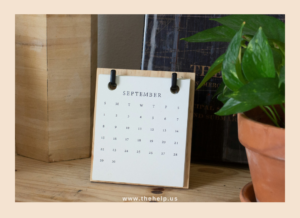
So, you’ve decided to get your calendar in order—great move! A well-organized calendar can be your best friend in managing time, reducing stress, and making sure you don’t miss important events. Whether you’re balancing work, family, or just trying to make time for yourself, here’s a simple, no-fuss guide to getting your calendar sorted.
1. Start with the Basics: What Needs to Be on Your Calendar?
Before you start plugging things into your calendar, take a moment to think about what actually belongs there. Your calendar should be a home for appointments, deadlines, meetings, and any other time-sensitive tasks. It’s not the place for your to-do list—that’s what a task manager is for. Keep it clean and focused on time-specific commitments.
2. Choose Your Tool: Digital or Paper?
Are you a digital native, or do you prefer the feel of pen on paper? Your choice of calendar tool matters. Digital calendars like Google Calendar, Apple Calendar, or Outlook are great for people who love syncing across devices, setting reminders, and color-coding. If you’re more into paper, a physical planner or wall calendar can be just as effective, especially if you like the tactile experience of writing things down. Choose what feels right for you.
3. Color Code Your Life
Color-coding is a simple but powerful way to organize your calendar. Assign different colors to different areas of your life—work, personal, family, health, etc. This makes it easy to see at a glance what your day or week looks like and ensures that nothing gets overlooked. Plus, it just makes your calendar look nicer!
4. Block Your Time
Time blocking is a game-changer. Instead of listing tasks to do whenever you get a chance, schedule specific blocks of time for them. Need to work on a project? Block out two hours on your calendar. Want to exercise? Schedule it in. This method helps you focus on one task at a time and reduces the temptation to multitask.
5. Don’t Forget Buffer Time
Life is unpredictable, and things often take longer than expected. That’s where buffer time comes in. Instead of scheduling your day down to the minute, leave some gaps between appointments or tasks. This gives you a cushion if something runs over or if you just need a breather. Trust me, your future self will thank you.
6. Review and Adjust Regularly
Your calendar isn’t set in stone. At the end of each week, take a few minutes to review what’s coming up. Are there any conflicts? Do you need to move things around? Regularly adjusting your calendar helps you stay on top of your commitments and ensures that you’re always prepared for what’s next.
7. Set Reminders
Even the best-organized calendar won’t help if you forget to check it. Set reminders for important events or tasks, especially those you’re likely to forget. Most digital calendars let you customize reminders, so take advantage of this feature.
8. Be Realistic
Finally, be realistic about what you can accomplish in a day. It’s tempting to fill every hour with tasks, but overloading your schedule can lead to burnout. Make sure you’re giving yourself enough time to rest, relax, and enjoy life outside of your to-do list.
Organizing your calendar is all about making it work for you. Keep it simple, keep it flexible, and most importantly, keep it realistic. With a well-organized calendar, you’ll find it easier to manage your time, reduce stress, and stay on top of everything life throws your way. Remember to work smart and be a blessing to someone today. Stay safe and healthy!
Written by Jaie O. TheHelp